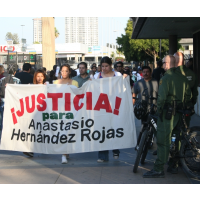Trump Administration Breaks Human Rights Tradition in Border Patrol Beating Death Case
 Demonstration over murder of Anastasio Hernandez-Rojas is observed by U.S. Border Patrol agents (R). (photo: AFSC)
Demonstration over murder of Anastasio Hernandez-Rojas is observed by U.S. Border Patrol agents (R). (photo: AFSC)
SAN DIEGO (CN) – Attorneys for the family of a man killed by Border Patrol agents said Monday the Trump administration will “lose badly” for failing to respond to the family’s petition regarding their loved one’s death at the border.
The Inter-American Commission on Human Rights took up a petition filed by the family of Anastasio Hernandez-Rojas in May claiming human rights abuses over Border Patrol agents’ extrajudicial killing of the San Diego man and what the family says was a botched investigation by U.S. government officials.
The U.S. government had until Aug. 10 to respond to the petition but has remained silent – breaking decades of tradition of cooperating with the human rights agency even with regard to abuse of prisoners kept at Guantanamo Bay.
Because the government has not responded to the petition, the commission can enter a default judgment against the United States – accepting the family’s claims as true.
Earlier this year, the United States did not participate in hearings before the commission. Roxanna Altholz, associate director at UC Berkeley Law School’s International Human Rights Law Clinic and one of the attorneys on the Hernandez-Rojas case, said the government’s refusal to participate is unprecedented.
“The United States has for the last several decades provided the [commission] resources and public support and actively participated before the [commission] system,” Altholz said at the Monday teleconference, noting the government has participated in dozens of cases previously.
“The Trump administration has departed from that history and tradition of participating,” she added. “That failure really signals disrespect for international institutions and international norms.”
According to a Border Patrol spokesman, the State Department has asked for an extension until mid-October to reply to the petition. It is not clear why the extension was requested or if the commission will grant it.
The commission did not return a phone request for comment on the current status of the petition.
Hernandez-Rojas was beaten by Border Patrol agents in 2010 when he was caught crossing the border. The beating put him in a coma before Hernandez-Rojas’ family decided to take him off life support.
The United States agreed to pay the family $1 million to settle a civil case in March. In 2015, The Justice Department declined to file criminal charges against the agents involved in Hernandez-Rojas’ death.
The petition by Herndandez-Rojas’ family is the first case taken up by the commission involving a claim for extrajudicial killing, torture and obstruction of justice within the United States.
Altholz said the United States faces “high political costs for that failure” to respond to the petition, and joins nations like Cuba, Nicaragua and Peru in opting not to respond to petitions brought against them over human rights violations.
“One need only to look at the newspapers to understand how regional leadership in human rights is particularly important right now,” Altholz said. “To be very simple, the United States will lose the case, and lose it badly.”
Andrea Guerrero, executive director local civil rights group Alliance San Diego, said the government’s nonresponse undermines its authority as a member of the commission to tell other countries how to cure human rights abuses.
“The abdication of responsibility here is undermining its authority on this body that it has consistently sought to be a part of in order to pass judgment on others. It cannot expect that others will listen to it, if the government does in fact not abide by the rules it is asking others to follow,” Guerrero said.
Maria Puga, Hernandez-Rojas’ widow, noted through a Spanish translator at the Monday teleconference that no Border Patrol agent has been held accountable for her husband’s death.
“The United States supports human rights, so why is this happening in my husband’s case?” Puga said. “Why stay silent? We want justice. The government must understand this family will not rest until this case has been cleared and justice has been served.”
To Learn More:
Inter-American Commission Takes U.S. Human Rights Abuse Case for First Time (by Bianca Bruno, Courthouse News Service)
In Wake of Bannon Appointment, Nation’s Largest Civil Rights Groups Promise Close Monitoring of Trump Policies (by Jesse J. Holland, Associated Press)
Border Patrol Agents Cleared in Shooting Deaths (by Elliot Spagat, Associated Press)
67 Border Patrol Shooting Internal Investigations; No Criminal Charges (by Noel Brinkerhoff, AllGov)
- Top Stories
- Unusual News
- Where is the Money Going?
- Controversies
- U.S. and the World
- Appointments and Resignations
- Latest News
- Trump Orders ICE and Border Patrol to Kill More Protestors
- Trump Renames National Football League National Trump League
- Trump to Stop Deportations If…
- Trump Denounces World Series
- What If China Invaded the United States?






Comments